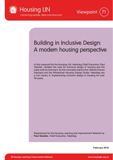LINks - latest Housing LIN bulletin (w/c 9 Feb 2015)
Welcome to LINks, the weekly e-bulletin from the Housing LIN (Learning and Improvement Network) where we put a selection of latest information, resources and events under the spotlight. In this week's issue, we would like to draw your attention to the following
New Housing LIN Viewpoint - Building in Inclusive Design: A modern housing perspective
 In this viewpoint for the Housing LIN, Habinteg Chief Executive, Paul Gamble, restates the case for inclusive design in housing and the wider built environment. As the innovators behind the Lifetime Homes Standard and the Wheelchair Housing Design Guide, Habinteg has a rich history in implementing inclusive design in housing for over 40 years. Here he sets out some of his thinking on inclusive design based on Habinteg's experience of providing inclusive homes and supporting both Lifetime Homes standards and Wheelchair Housing Design Guide.
In this viewpoint for the Housing LIN, Habinteg Chief Executive, Paul Gamble, restates the case for inclusive design in housing and the wider built environment. As the innovators behind the Lifetime Homes Standard and the Wheelchair Housing Design Guide, Habinteg has a rich history in implementing inclusive design in housing for over 40 years. Here he sets out some of his thinking on inclusive design based on Habinteg's experience of providing inclusive homes and supporting both Lifetime Homes standards and Wheelchair Housing Design Guide.
Read in full at: www.housinglin.org.uk/InclusiveDesign_Viewpoint
London Plan targets for older peoples specialist housing
A useful Factsheet has been published on the implications and opportunities arising from the Further Alterations to the London Plan. Produced by iceni projects it illustrates progress against indicative requirement benchmarks for specialist housing for older people in each London borough, highlighting the shortfall in provision especially in units for private sale.
View at: www.housinglin.org.uk/HousingRegions/London/discuss/forum/?obj=viewThread&threadID=872&forumID=82
Have your say on the future of the English Housing Survey (EHS)
DCLG have published consultation on the future of the EHS, including a proposal to only publishing information every two years instead of annually. As the sole source of in depth analysis of the housing situation in England (covering household composition/ tenure trends/ stock condition etc) this significant reduction to the EHS would represent a major loss of information upon which to base policy and decision making.
It seems that the information of particular interest to Housing LIN members focuses on housing in relation to ageing, health, disability, fuel poverty and stock condition, as well as the regional analysis. Loss of such data may also impact on the evidence base for other Government Department and wider policy and investment decisions, for example, on public health & fuel poverty. The deadline for responses is Tuesday, 17th February.
Have your say at: www.gov.uk/government/consultations/consultation-on-the-future-shape-of-the-english-housing-survey
Dementia Leaders Programme for the Housing Sector - Scheme Managers
Sitra, the Association of Dementia Studies (ADS), at the University of Worcester, and the Housing Learning and Improvement Network (LIN) have come together in a learning partnership to deliver an innovative dementia leaders programme specifically for the housing sector.
This 4 day course (10/11 March and 28/29 April) is aimed specifically for Scheme Managers.
For more information, visit: www.sitra.org/training/dementia-leaders-programme-for-the-housing-sector
Occupational therapists working in social housing save money
As an honoury life member of the College of Occupational Therapist Specialist Section for Housing, Jeremy is pleased to report that The Guardian ran a special series on occupational therapy.
Topics included a useful feature by Anthony Allen an OT at Teign Housing and Westward Housing, 'Occupational therapists working in social housing save money'.
CQC issues draft guidance for providers to display ratings
CQC have issued draft guidance for consultation on how providers across England can make sure they are meeting the government's new requirement for them to prominently display their performance ratings from April. The Care Act 2014 places a duty on CQC to inspect the performance of health and adult social care services and to present these judgements as ratings. CQC rate services as Outstanding, Good, Requires Improvement or Inadequate so that the public has clear information to help them make informed choices about their care, including in housing with care settings.
CQC have now developed guidance setting out how providers can meet this new requirement and have launched a rapoid consultation for providers, members of the public and others to share their comments. At the same time, CQC are consulting on draft guidance for providers on some minor amendments carried over from the CQC (Registration) Regulations 2009.
The closing date for all comments is Wednesday 25 February.
More information - and to provide feedback - on the display of ratings and other amended regulations is available here: www.cqc.org.uk/guidanceconsultation
Delivering Care & Support Planning
This guide from TLAP has been developed with people who use services to show what good care and support planning looks like in practice. With examples from councils across England, it describes the principles for what people want in a care and support planning process, the elements that need to be in place and recommendations for councils so they can be both Care Act compliant and person-centred in their approach.
Available from: www.thinklocalactpersonal.org.uk/Latest/Resource/?coid=10464